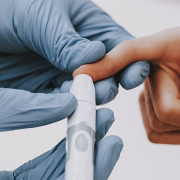Professional journeys into genomics: A long and winding road
In this final instalment of our 2024 Genomics Conversation blog series, we ask Amy, Bernadette, Jessica, Marianne and Tobi how they feel about the future of genomic medicine
Our expanding knowledge of genomics means that its integration into healthcare is an ever-changing and evolving journey. In this third and final instalment of our blog series for this year’s Genomics Conversation, we asked our five NHS healthcare professionals about their thoughts on the future of genomic medicine in the UK, and what advice they would give to colleagues just starting out on their own genomics journey.
Catch up on parts one and two of our blog series.
“I think NIPT for midwifery is a prime example of how genomics can greatly improve women’s experience.”
“I think [genomics] is the future,” says Dr Bernadette Khodaghalian, a paediatrician by background who has just finished her specialist training in inherited cardiac conditions. “It’s inevitable. When you look at children with cystic fibrosis or inherited heart conditions and you’re talking about future treatments, you’re talking about gene therapies, you’re talking about precision medicine. It’s incredibly important.”
“I think NIPT for midwifery is a prime example of how genomics can greatly improve women’s experience,” says Marianne Quinn, regional NIPT screening midwife co-ordinator. “For midwifery, I think it’s the easiest way to get genomics into practice, because midwives want the best for women, they want the best tests they can get.”
“The future is bright,” says cardiology registrar Dr Tobi Soge. “I think [genomics is] getting out there more and more. One patient was seen by a cardiac nurse and there was a pedigree in the notes, which was unusual – I was shocked. No one ever draws up a family tree. People are becoming informed.”
“We know it’s difficult to teach an old dog new tricks, but if [genomics is] part of education right from the beginning, it’s not going to be a big deal anymore.”
Genomics may play an important role in the future of medicine, but integrating it across the entire system can feel like a daunting task. The biggest challenge, Marianne believes, is in convincing busy healthcare professionals that genomics could make a positive impact on their practice. “I think with anything that’s a bit outside the comfort zone, it’s trying to show how it’s relevant to the midwives,” she says. “At the moment, you’re talking about genetics and inheritance and they’re saying it’s irrelevant. If we show them a way that it improves the woman’s experience, that it improves their job and their ability to improve outcomes for their patients… Even though maternity is in crisis, every midwife, every nurse still wants to offer the best, to give the best care.”
When asked about the challenges he foresees to the mainstreaming of genomic medicine, Tobi is quick to emphasise the need for genomics to be incorporated into the undergraduate medical degree curriculum across the UK. “The demand [for genomic testing] has gone way, way up,” he says, “but there is not a lot of focus on genomics in undergraduate education. When it becomes part of normal practice, people are not going to think twice about genetic conditions because it will be something they’re quite used to, they’ll be able to request genomic tests themselves. But until everybody does that, until every single specialty gets on board, it’s a bit overwhelming … We know it’s difficult to teach an old dog new tricks, but if it’s part of education right from the beginning, it’s not going to be a big deal anymore.”
“You don’t want to just train the existing workforce – then you’re always playing catch-up. You definitely need to get in there with the undergrads.”
Of course, some areas of healthcare are already forging this path. “We’re really quite fortunate in pharmacy,” says Jessica Keen, a practising pharmacist and pharmacy lead for the North West Genomic Medicine Service Alliance (GMSA), “because genomics has been incorporated into the undergraduate pharmacy programme – so we’re in a place now where, as these new pharmacists become qualified, genomics won’t be new and scary to them.” She agrees that including genomics modules in healthcare-related courses is vital to the successful mainstreaming of genomic medicine. “You don’t want to just train the existing workforce – then you’re always playing catch-up. You definitely need to get in there with the undergrads.”
For Bernadette, another significant challenge to the mainstreaming of genomic medicine is going to be getting the infrastructure in place. “We have this power and this availability, but now we’ve got masses and masses of data and we don’t have the personnel or the IT infrastructure to deal with it,” she says. “I hope that that can catch up, because in reality that’s probably the only way it’s going to be truly mainstreamed in everyday medicine.”
“There are free resources out there, you can just do a little self-test module at home. It doesn’t have to be formal.”
So what advice would our group give to people in their areas of healthcare who are just getting started on their own genomics journey?
A lot of emphasis is placed among the group on accessing free educational resources. When asked for guidance herself, Bernadette will tell colleagues, “‘There are free resources out there, you can just do a little self-test module at home. It doesn’t have to be heavy, it doesn’t have to be formal.’ Because the reality is, service provision comes first and there’s very little time for anything else.”
“The Genomics Education Programme website is great,” adds Tobi. “I think that’s the first step for a lot of people interested in genomics.”
Marianne’s advice is to start with the basics. “It’s kind of overwhelming,” she admits. “If you say you want to learn everything about genomics, it can start feeling irrelevant. So I would start with something small.”
“It takes one person, just one person.”
Lynch syndrome specialist nurse Amy Roberts is keen to emphasise the importance of asking colleagues for help. “Consider shadowing clinical geneticists, genetic counsellors, observing pathology processes,” she says. “Really get a feel for what happens on the patient journey.”
Talking about pharmacy, Jessica says, “GMSA lead pharmacists are the people to speak to in each region, because our job is to help embed genomics – and the best way we can do that is by helping the people who deliver the healthcare.”
“There are people in every specialty who are interested in genomics, we just don’t know them,” adds Tobi. “We need to build that network.”
Bernadette agrees. “My journey started because someone I emailed took the time to come and sit down with me for 20 or 30 minutes,” she says. “That has changed my career path. It takes one person, just one person. Now, if someone emails me, I say, ‘This way. This is how you can find these resources.’ And hopefully I might be that one person. You never know.”
Are you a healthcare professional who has taken steps to learn more about genomic medicine? Maybe you have progressed to a new, more genomics-focused role; maybe you’re using your valuable newfound knowledge in your existing role. Maybe you’ve never thought much about genomics and want to give it a try! Whatever stage you’re at on your own genomics journey, why not join the conversation? Follow us on X, LinkedIn and Facebook to keep up to date with what’s happening for the rest of this year’s Week of Action.









